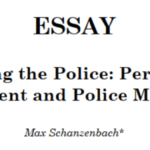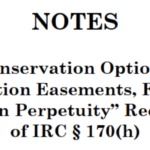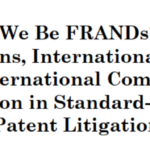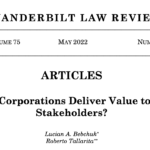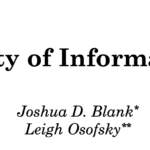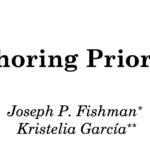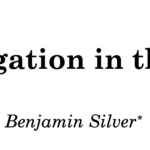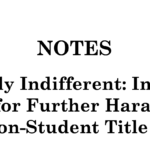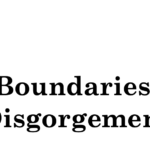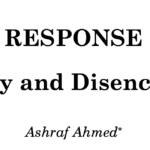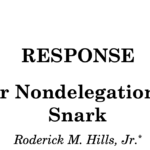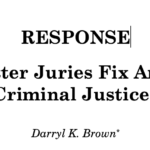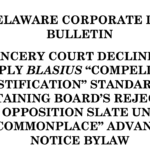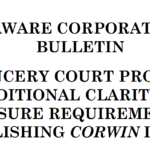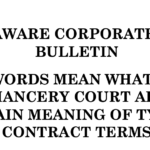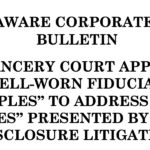Volumes Category
Policing the Police: Personnel Management and Police Misconduct
Oct. 20, 2022—Max Schanzenbach | 75 Vand. L. Rev. 1523 Police misconduct is at the top of the public policy agenda, but there is surprisingly little understanding of how police personnel management policies affect police misconduct. Police-civilian interactions in large jurisdictions are, in principle at least, highly regulated. But these regulations are at least partially counteracted by...
Conservation Options: Conservation Easements, Flexibility, and the “In Perpetuity” Requirement of IRC § 170(h)
Oct. 20, 2022—Molly Teague | 75 Vand. L. Rev. 1573 Conservation easements have been closely tied to tax incentives since the 1970s, when Congress passed legislation to encourage land preservation. In an attempt to balance the desire to conserve more land with the desire to prevent tax abuses, Congress later passed § 170(h) of the Internal Revenue Code,...
Why Can’t We Be FRANDs?: Anti-Suit Injunctions, International Comity, and International Commercial Arbitration in Standard-Essential Patent Litigation
Oct. 20, 2022—Raghavendra R. Murthy | 75 Vand. L. Rev. 1609 Picking up a smartphone to contact someone across the globe is facilitated by technical standards like 5G. These standards allow for technological compatibility worldwide. For instance, a 5G capable device can connect to 5G networks anywhere in the world because the same 5G standard is used...
Will Corporations Deliver Value to All Stakeholders?
May. 18, 2022—Lucian A. Bebchuk & Roberto Tallarita | 75 Vand. L. Rev. 1031 (2022) | Amid growing concerns for the effects that corporations have on stakeholders, supporters of stakeholder governance advocate relying on corporate leaders to use their discretion to protect stakeholders, and they seem to take corporate pledges to do so at face value. By contrast, critics...
The Inequity of Informal Guidance
May. 18, 2022—Joshua D. Blank & Leigh Osofsky | 75 Vand. L. Rev. 1093 (2022) | The coexistence of formal and informal law is a hallmark feature of the U.S. tax system. Congress and the Treasury enact formal law, such as statutes and regulations, while the Internal Revenue Service offers the public informal explanations and summaries, such as...
Authoring Prior Art
May. 18, 2022—Joseph P. Fishman & Kristelia García | 75 Vand. L. Rev. 1159 (2022) | Patent law and copyright law are widely understood to diverge in how they approach prior art, the universe of information that already existed before a particular innovation’s development. For patents, prior art is paramount. An invention can’t be patented unless it is...
Nondelegation in the States
May. 18, 2022—Benjamin Silver | 75 Vand. L. Rev. 1211 (2022) | American public law is on the precipice of a nondelegation revival. Yet scholars have largely ignored the greatest wellspring of American nondelegation law: that of the states. As a result, the nondelegation literature is badly in need of a broad and deep examination of state nondelegation....
Deliberately Indifferent: Institutional Liability for Further Harassment in Student-on-Student Title IX Cases
May. 18, 2022—Jacob R. Goodman | 75 Vand. L. Rev. 1273 (2022) | Sexual harassment is an unfortunate problem far too many have experienced. Universities and other educational institutions owe a duty, both legal and moral, to protect students from sexual harassment, and in turn to allow students to receive the full benefits of their education. But a...
Finding the Boundaries of Equitable Disgorgement
May. 18, 2022—Cameron K. Hood | 75 Vand. L. Rev. 1307 (2022) | The disgorgement of “ill-gotten gains” is a significant mechanism for enforcing the securities laws. By compelling a violator of the securities laws to forfeit their illegal proceeds, disgorgement serves as a strong deterrent for securities fraud and an important method by which investors are compensated...
Democracy and Disenchantment
May. 17, 2022—Ashraf Ahmed | 75 Vand. L. Rev. En Banc 223 (2022) | This piece is a response to Ryan D. Doerfler & Samuel Moyn, The Ghost of John Hart Ely, 75 VAND. L. REV 769 (2022). The Ghost of John Hart Ely is Doerfler and Moyn’s latest salvo against American judicial review. This time, however, their...
Hunting for Nondelegation Doctrine’s Snark
May. 17, 2022—Roderick M. Hills, Jr. | 75 Vand. L. Rev. En Banc 215 (2022) | This piece is a response to Ben Silver, Nondelegation in the States, 75 VAND. L. REV. 1211, 1221 (2022). There is much to like about Silver’s article: it is analytically sharp, doctrinally comprehensive, and written with clarity and grace. Moreover, on...
Can Better Juries Fix American Criminal Justice?
May. 17, 2022—Darryl K. Brown | 75 Vand. L. Rev. En Banc 205 (2022) | This piece is a response to Daniel Epps & William Ortman, The Informed Jury, 75 VAND. L. REV. 823 (2022). Professors Daniel Epps and William Ortman argue that it could. In their Article The Informed Jury, Epps and Ortman propose that trial...
CHANCERY COURT DECLINED TO APPLY BLASIUS “COMPELLING JUSTIFICATION” STANDARD IN SUSTAINING BOARD’S REJECTION OF OPPOSITION SLATE UNDER “COMMONPLACE” ADVANCE NOTICE BYLAW
May. 12, 2022—Robert S. Reder & Gabrielle M. Haddad | 75 Vand. L. Rev. En Banc 195 (2022) | Under § 141(a) of the Delaware General Corporation Law (“DGCL”), “the business and affairs of every corporation . . . shall be managed by or under the direction of a board of directors . . . .” In light of this sweeping grant of authority to...
CHANCERY COURT PROVIDES ADDITIONAL CLARITY ON DISCLOSURE REQUIREMENTS FOR ESTABLISHING CORWIN DEFENSE
May. 12, 2022—Robert S. Reder & Stanley N. Medlin | 75 Vand. L. Rev. En Banc 187 (2022) | At the other end of the spectrum, as explained by Vice Chancellor Sam Glasscock III in Galindo v. Stover, CA No. 2021-0031-SG (Del. Ch. Jan. 26, 2022) (“Galindo”), “directors need not provide exhaustive information in seeking a stockholder...
THE WORDS MEAN WHAT THEY SAY: CHANCERY COURT ADHERES TO PLAIN MEANING OF TYPICAL CONTRACT TERMS
May. 12, 2022—Robert S. Reder & Paul W. d’Ambrosio | 75 Vand. L. Rev. En Banc 179 (2022) | In Yatra Online, Inc. v. Ebix, Inc., C.A. No. 2020-0444-JRS (Del. Ch. Aug. 30, 2021), Vice Chancellor Joseph R. Slights III ruled that a merger agreement provision stating “there shall be no liability on the part of any...
CHANCERY COURT APPLIES “WELL-WORN FIDUCIARY PRINCIPLES” TO ADDRESS “NOVEL ISSUES” PRESENTED BY SPAC DISCLOSURE LITIGATION
May. 12, 2022—Robert S. Reder | 75 Vand. L. Rev. En Banc 167 (2022) | In In Re MultiPlan Corp. S’holders Litig., 268 A.3d 784 (Del. Ch. 2022) (“MultiPlan”), the Delaware Court of Chancery (“Chancery Court”) confronted—for the first time—litigation over one of the most popular devices currently available to privately-held businesses seeking “to access the public...
